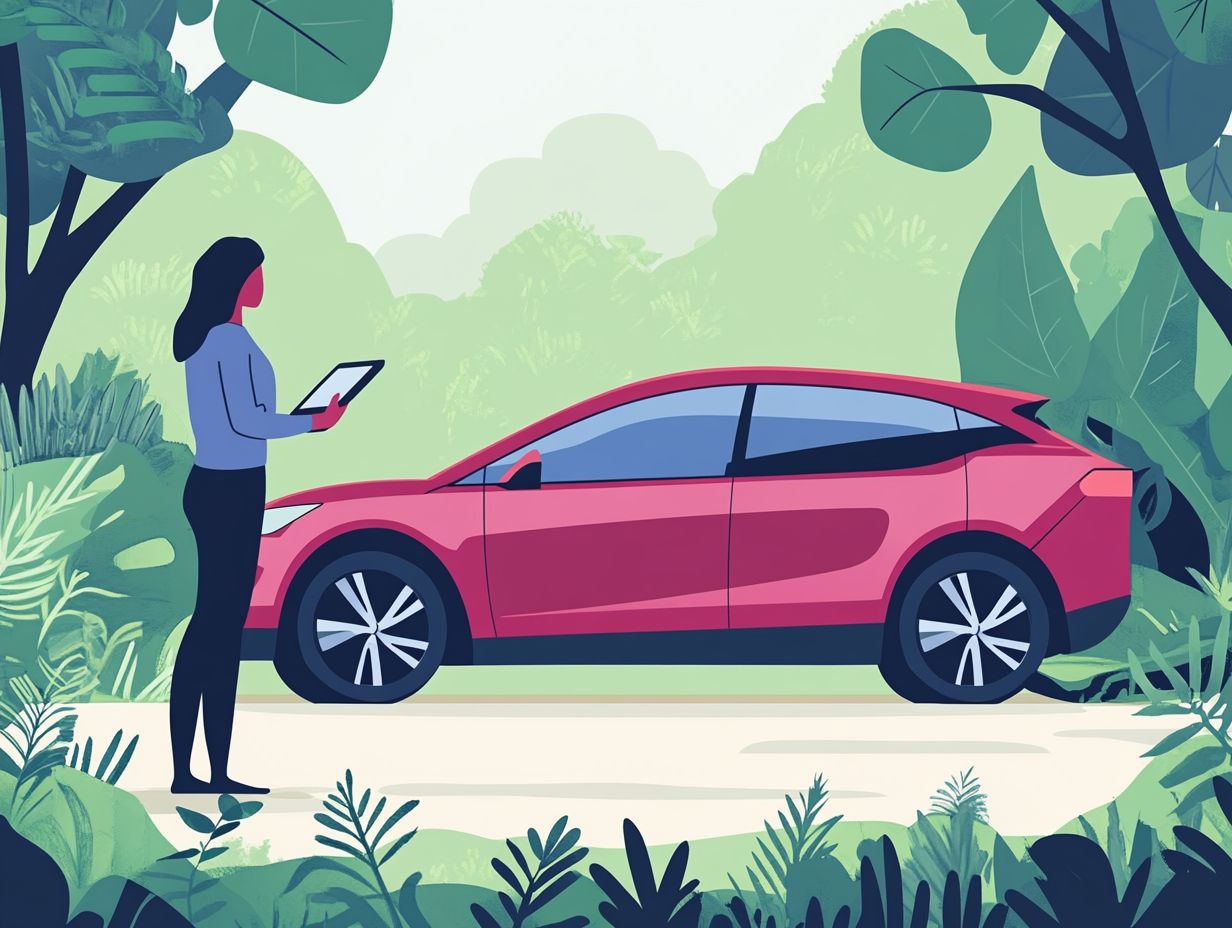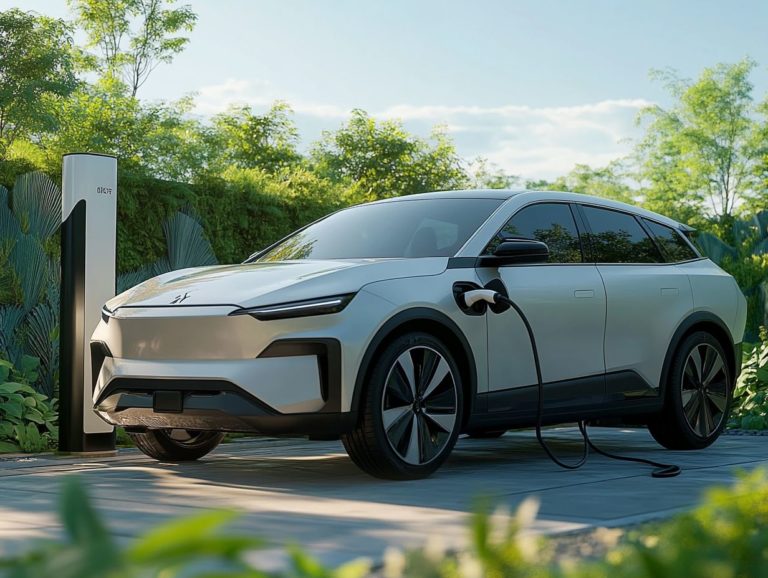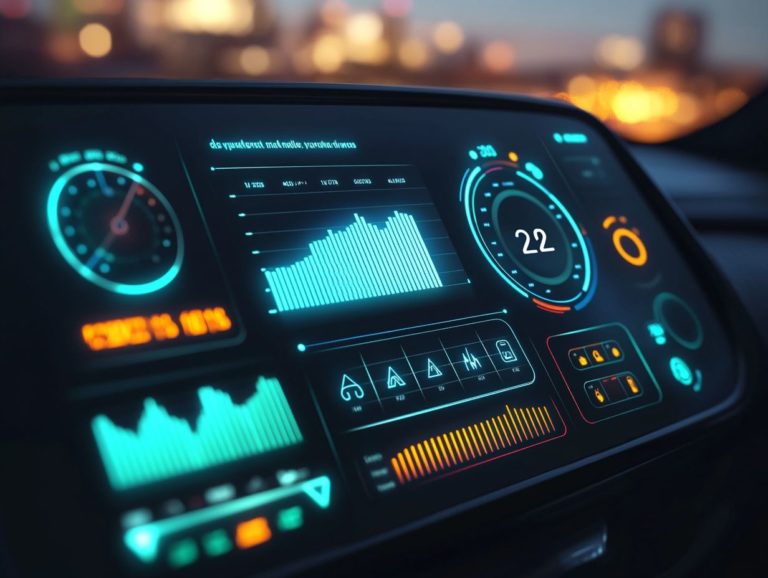How Do I Know If an EV is Right for Me?
Electric vehicles (EVs) are changing transportation. They combine sustainability with innovative technology.
Owning an EV has many benefits, from helping the environment to saving on costs. You will explore key factors to consider before buying one.
By the end, you ll be ready to decide if an EV fits your lifestyle.
Contents
- Key Takeaways:
- Benefits of Owning an EV
- Factors to Consider Before Purchasing an EV
- How to Determine if an EV is Right for You
- Frequently Asked Questions
- How Do I Know If an EV is Right for Me?
- Thinking about switching to an electric vehicle (EV)? Let s explore what makes EVs a great choice!
- What is an EV and how does it differ from a traditional car?
- What are the benefits of owning an EV?
- Do I need to have a charging station at my home to own an EV?
- What factors should I consider before purchasing an EV?
- Are there any drawbacks to owning an EV?
Key Takeaways:

- Consider your driving habits and lifestyle before purchasing an EV. It’s a great choice if you have a short daily commute and access to charging stations.
- Assess your priorities to determine if an EV is right for you. Think about cost savings and environmental impact.
- Research and test drive EVs to make an informed decision. This helps you understand the features of different models.
What are EVs and How do They Work?
Electric Vehicles (EVs) represent a major shift in transportation. They use advanced battery technology to provide a cleaner driving experience.
EVs are powered by electric motors and rechargeable batteries. You can charge them at home or at public stations, making them a smart alternative to gas vehicles.
The electric motors efficiently convert electrical energy into mechanical power. This means you get impressive torque and efficiency.
Battery electric vehicles (BEVs) use only electric motors, while plug-in hybrids mix electric and gas engines. This gives you more flexibility for longer trips.
There are various charging options, including home chargers and rapid DC fast charging stations. This flexibility is a significant advantage of EVs.
As more people adopt EVs, the charging infrastructure is growing. Government initiatives are also promoting cleaner transportation.
Benefits of Owning an EV
Owning an electric vehicle (EV) brings exciting benefits that can transform your driving experience! You can save significantly on fuel and maintenance costs.
With government incentives, you can enjoy lower electricity costs than traditional gas vehicles. This helps reduce emissions and supports a healthier environment.
The combination of energy efficiency and low maintenance makes EVs a smart choice for long-term savings.
Environmental Impact and Cost Savings
The environmental impact of electric vehicles (EVs) is substantial. They play a critical role in reducing emissions while offering considerable cost savings over time.
When you switch from traditional gas vehicles to battery electric vehicles, you can enjoy lower electricity costs. You might also qualify for tax credits, making this switch financially advantageous.
EVs are engineered for energy efficiency, presenting a cleaner alternative that boosts your savings and fosters sustainability on a larger scale.
By operating on electricity instead of fossil fuels, EVs drastically cut greenhouse gas emissions, significantly improving air quality in urban environments. Economically, you could save thousands over the lifespan of an EV, with studies indicating potential savings of up to $4,000 from reduced fuel and maintenance costs.
Many regions provide attractive tax incentives and rebates for electric vehicle purchases, further alleviating the financial burden and encouraging widespread adoption.
By making the switch to an EV, you not only contribute to the fight against climate change but also reap ongoing savings that enhance your overall financial well-being.
Factors to Consider Before Purchasing an EV

Before you commit to purchasing an electric vehicle (EV), it’s vital to consider several factors that could greatly impact your experience. To help you make the best choice for your needs, think about your personal driving habits, the infrastructure available to you, and the vehicle’s range by exploring how to select the right EV for family use.
Understanding your daily mileage and assessing whether you have access to home charging or public chargers can ease any concerns about range anxiety. This will help you select a model that aligns with your lifestyle. Charging options differ significantly, so identifying the best fit for your needs is essential for making a well-informed decision about your future EV.
Personal Driving Habits and Lifestyle
Understanding your personal driving habits and lifestyle is essential when considering an electric vehicle (EV). These factors significantly influence your model choice and its efficiency. To make an informed decision, you should consider what to look for when buying an EV, including evaluating your typical daily mileage, whether road trips are a part of your routine, and how often you can conveniently charge your vehicle at home.
These insights will guide you in determining the range you need from your EV and how to manage energy costs effectively in your daily life. For example, if you have a short daily commute, a compact model like the Nissan Leaf could be a perfect match, effortlessly covering your urban driving needs. To explore more options, check out this guide on how to identify your ideal EV.
On the other hand, if longer trips are on your horizon, you might be drawn to robust options such as the Ford F-150 Lightning, which boasts an extended range and faster charging capabilities, ideal for those weekend getaways.
Recognizing how range correlates with energy costs not only helps you choose the right vehicle but also encourages a more sustainable driving approach that aligns with your regular journey patterns.
Infrastructure and Availability
The availability of charging infrastructure is a crucial element to consider when you re thinking about purchasing an electric vehicle (EV). This can make or break how enjoyable owning your EV will be! Take a moment to assess the proximity of charging stations and the variety of charging options available, such as fast chargers and Level 2 chargers.
Don t forget to factor in the installation costs for home charging and the policies of your local electric utility, as these will have a direct impact on your overall EV experience.
Home charging typically offers the luxury of recharging overnight, allowing you to wake up each day with a full battery. Public charging stations provide the flexibility necessary for longer journeys, but they may require a bit of planning and could come with longer wait times.
Evaluating the costs associated with installing a home charging unit, along with exploring local electric utility programs for incentives, can lead to substantial savings and a smoother transition to electric driving. These incentives can slash your initial costs, making now the perfect time to jump into sustainable transportation!
How to Determine if an EV is Right for You
Determining if an electric vehicle (EV) fits your lifestyle requires careful consideration of your unique needs and priorities, along with research on how to determine your EV needs and an exploration of different models.
Begin by assessing your daily requirements. Consider how frequently you embark on long journeys and what ways to recharge your vehicle align seamlessly with your daily routine.
Then, delve into the electric models available today, including standout options like the Hyundai Ioniq 5 and Kia EV6.
This exploration will provide you with valuable insights into their performance, features, and overall compatibility with your driving habits.
Assessing Your Needs and Priorities

When considering the purchase of an EV, make sure to evaluate your own needs and priorities regarding mileage, range, and driving habits by following this guide on how to choose between EV models.
Think about how often you take long drives compared to your daily commutes. This insight will guide you in determining the range your EV should offer.
Aligning these factors with your lifestyle will help ensure a smooth transition to electric driving.
Take a moment to reflect on your routine: do you frequently embark on road trips or weekend getaways that require higher mileage capacity? Remember, the EV market is diverse some models shine in urban settings while others are tailored for longer journeys.
By understanding your typical driving patterns, you’ll have the ability to choose an electric vehicle that meets your daily needs, enhancing your overall experience.
This thoughtful approach not only helps you make a practical choice but also reinforces your commitment to sustainability and reducing your carbon footprint.
Researching and Test Driving EVs
Researching and test-driving various EV models is an essential step in ensuring you discover the perfect match for your lifestyle and preferences, including understanding how to evaluate EV range before buying.
Start by exploring different brands, such as Tesla and Ford, and their electric offerings, including the Ford F-150 and Chevrolet Bolt.
Many dealerships provide the opportunity for test drives, allowing you to experience the drive firsthand and assess how well the vehicle aligns with your requirements.
The automotive world is changing quickly, so understanding the features each EV offers ranging from battery range (how far you can drive on a single charge) to tech integrations can greatly influence your decision.
For example, Tesla’s Autopilot feature distinguishes it with its advanced self-driving capabilities, while the Chevrolet Bolt impresses with its range at a more accessible price point.
Taking the time to compare these unique attributes will ensure that your eventual choice meets your personal needs and budget.
Test driving is not just a formality; it’s an invaluable chance to evaluate how a model performs in real-world scenarios, leading to a more informed and satisfying decision.
Making an Informed Decision
Making an informed decision about purchasing an EV means synthesizing all the information you’ve gathered regarding your driving habits, vehicle compatibility, and available charging options. To help with this process, check out our guide on how to choose the best EV for your budget.
After conducting thorough research and taking some test drives, evaluate which models best align with your lifestyle and budget, keeping in mind the long-term benefits, such as reduced emissions and lower maintenance costs.
Assessing features like battery range, performance, and user reviews can significantly influence your choice.
It’s essential to weigh your options, not just for immediate needs but also for a sustainable future.
Don’t wait! The benefits of owning an EV are waiting for you. With incentives and rebates available in many regions, the financial benefits make EV ownership even more appealing.
Ultimately, taking the time to understand your personal priorities, alongside comprehensive market research, gives you the power to make a confident purchase that aligns with your values and aspirations.
Frequently Asked Questions
How Do I Know If an EV is Right for Me?

An electric vehicle (EV) is a great option for many people, but it’s not the right choice for everyone. To help you decide, check out this guide on how to choose the right EV for your lifestyle that addresses some common questions and answers.
Thinking about switching to an electric vehicle (EV)? Let s explore what makes EVs a great choice!
What is an EV and how does it differ from a traditional car?
An EV runs solely on electric power, while a traditional car uses gasoline. This means an EV produces zero emissions and doesn’t require trips to the gas station. However, an EV does need to be charged at home or at a charging station.
What are the benefits of owning an EV?
Besides being environmentally friendly, EVs have lower operating costs and require less maintenance. Make the switch now and start saving money while helping the planet!
Plus, you’ll enjoy a smooth and whisper-quiet ride that makes every trip feel special!
Do I need to have a charging station at my home to own an EV?
While having a charging station at home is convenient, it’s not necessary. You can also charge your EV at public charging stations, which are becoming more common in cities and along highways.
What factors should I consider before purchasing an EV?
Some important factors to consider are the range of the EV and your daily driving habits. To make an informed decision, learn how to find the right EV for your commute by checking the cost of electricity where you live and looking for any tax breaks for owning an EV. Additionally, consider the availability of charging stations in your area.
Are there any drawbacks to owning an EV?
The upfront cost of an EV can be higher than that of a traditional car. The range of an EV may limit long trips. Charging times can also be longer than refueling at a gas station. However, these factors may vary depending on the specific model of EV.






